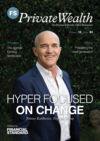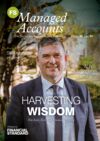Rest's MySuper option returns 8.67% in FY24BY ANDREW MCKEAN | WEDNESDAY, 3 JUL 2024 12:02PMRest's core strategy default MySuper investment option, where most of its two million members are invested, delivered a one-year return of 8.67% over the last financial year. This exceeds its long-term average annual return of 8.29% since July 1988. For its pension members, the default balanced investment option returned 7.56%. The standout, however, was Rest's low-cost overseas shares - indexed option, which returned 18.07%. That option has around 10,000 members invested in it. Rest chief investment officer Andrew Lill said the results were a continuation of the fund's strong long-term performance, notwithstanding global markets grappling with stubborn inflation. "As we neared the end of last calendar year, Rest believed there was a significant risk that markets were declaring a premature victory over inflation. Recent months have largely played out in line with our expectations that core inflation would be sticky and cash rates would be higher for longer," Lill said. However, companies with strong balance sheets, higher profitability, and strong earnings have achieved considerable gains, he said. He said Rest's exposure to these higher-quality companies, including many of the magnificent seven tech stocks at the forefront of artificial intelligence (AI) development, and the decision to stay fully invested in listed equities, has been strongly rewarded. "These shares have provided a great financial benefit for our members this past financial year," he said. Rest has approximately $4.5 billion invested in the magnificent seven through its core strategy option, meaning a member with an average balance would own over $2000 worth of shares in these companies. While inflation is trending in the right direction in most developed markets, Rest still believes the world is heading into a period of higher structural inflation and greater macroeconomic volatility than experienced in recent times. "It's critical we maintain a well-diversified, resilient portfolio and the expertise to identify opportunities in this environment that add long-term value for our two million members," Lill said. Rest has identified digitalisation as one of the megatrends that will shape the global economy over the long-term. "... we are firmly of the view that the recent enthusiasm for AI and tech innovation is not simply a passing trend. We think more beneficial opportunities will appear thanks to the ongoing digitalisation of the economy and society," Lill said. Additionally, Rest contends megatrends such as decarbonisation, deglobalisation, demographics, and central bank policy are key factors that will shape the future direction of the global economy. "Around half our members are aged under 30 and will be retiring many decades from now. We have a clear focus on growing their retirement savings by harnessing the long-term factors that will drive the markets and the global economy over the coming decades and beyond," Lill said. In recognition of the age profile of its members, Rest's board, chaired by James Merlino, has approved a higher allocation to growth assets in its core strategy. The allocation to equities was increased by 2.5% last year. Following this, Rest has made significant investments in industrial property, including a joint venture with Barings in May. In April, it also a signed on as a cornerstone investor to the Fidelity Real Estate Logistics Impact Climate Solutions (LOGICs) Fund. Rest believes these investments will benefit from the deglobalisation of supply chains, the decarbonisation of the economy, and the digitalisation of commerce and retail. "We've also made a $1 billion commitment with Quinbrook Infrastructure Partners, which will provide exposure to a range of assets like green data centres, and solar and battery projects," Lill added. Related News |
Editor's Choice
Future Super returns 10.1% to ethically minded members
|AMP snares retirement expert
|Cbus MySuper investment option returns 8.35%
|New technology chief joins GROW Inc.
|Products
Expert Feed
Industry Events
Featured Profile

Shail Singh
AUSTRALIAN FINANCIAL COMPLAINTS AUTHORITY























